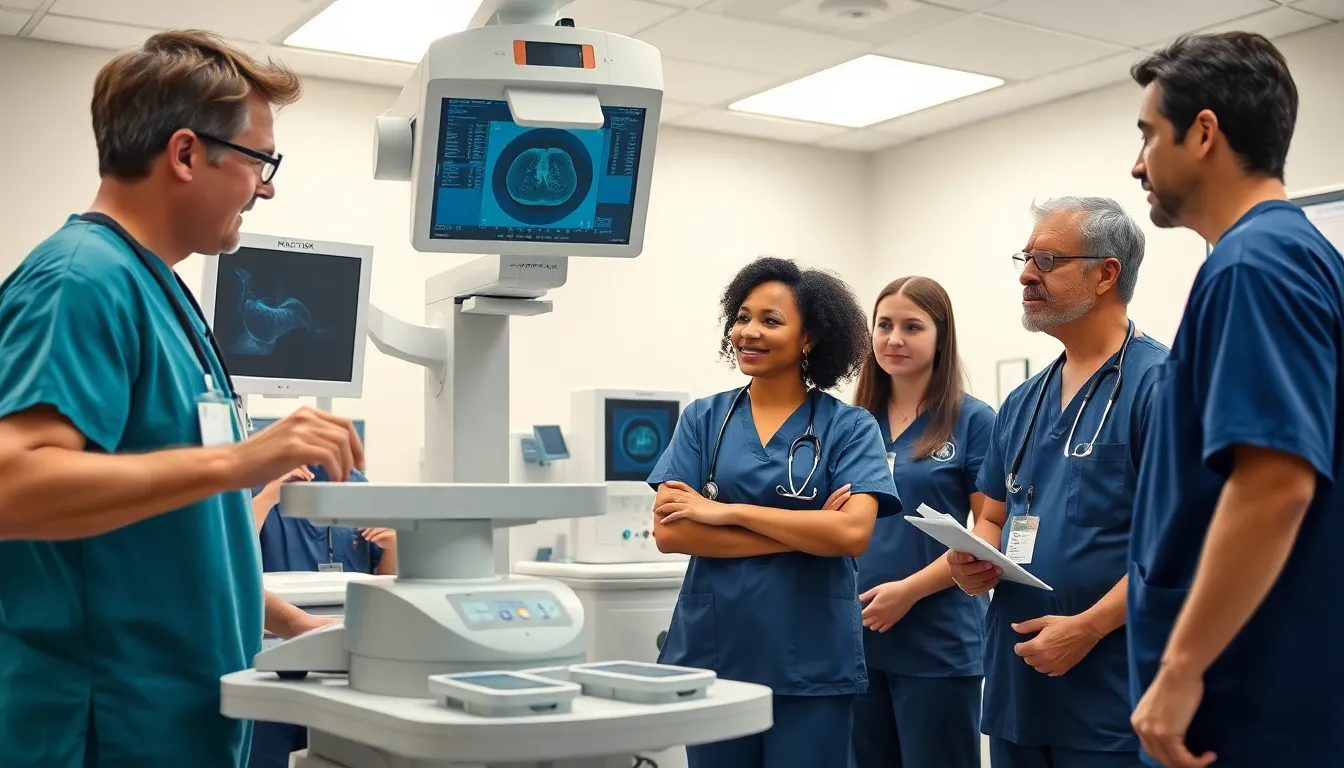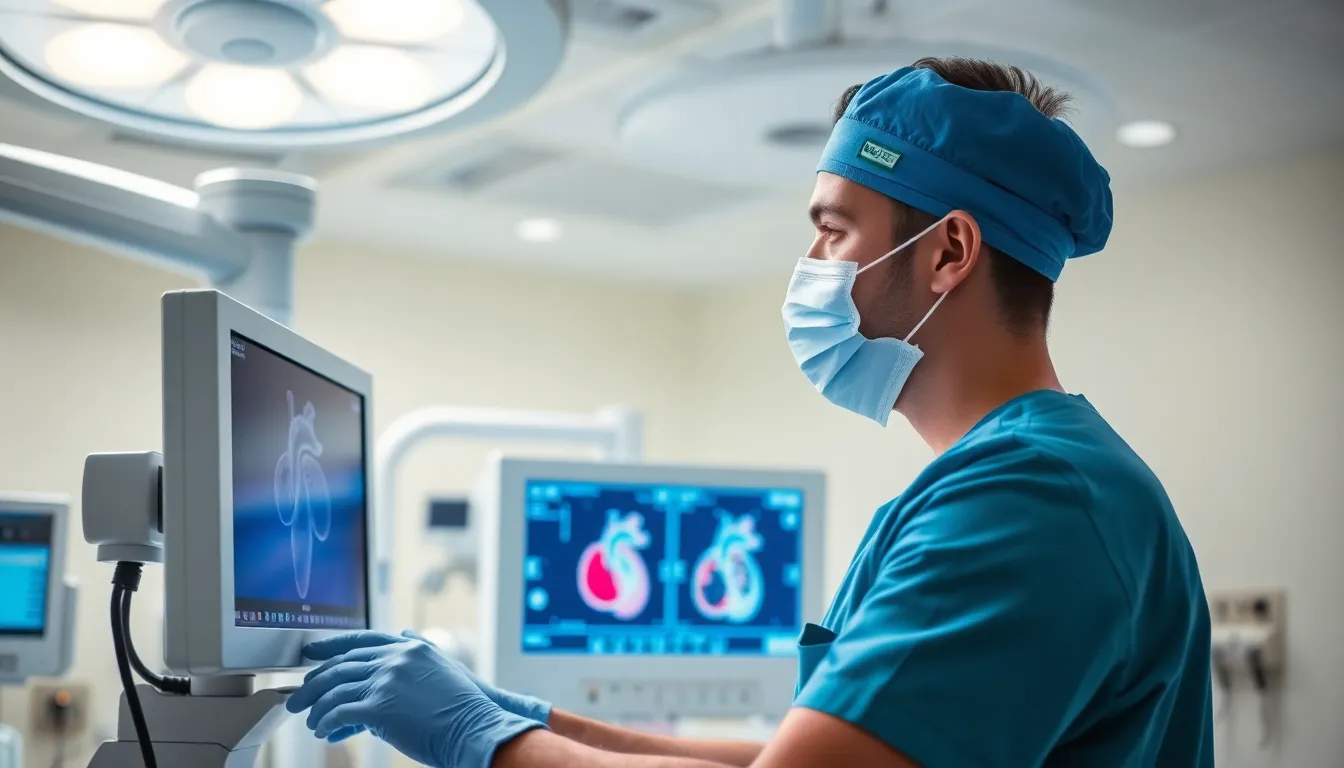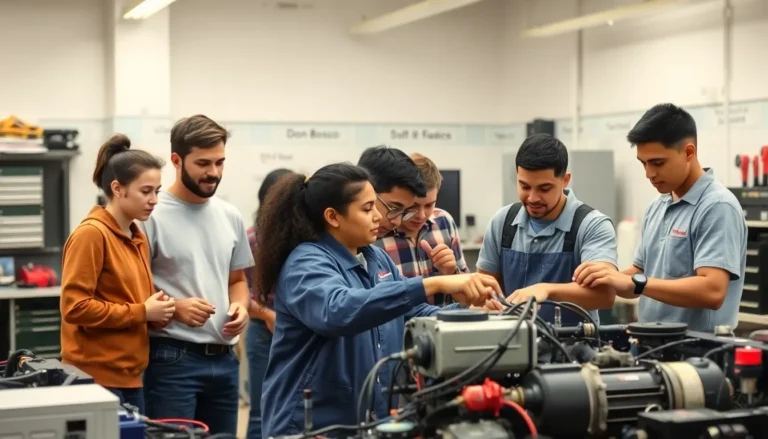In the fast-paced world of healthcare, cath lab techs are the unsung heroes, wielding their skills like superheroes in scrubs. These professionals play a crucial role in diagnosing and treating heart conditions, all while making sure the equipment is as ready as a barista on a Monday morning. But how does one become a cath lab tech? Enter cath lab tech programs, the training ground for future heart heroes.
Table of Contents
ToggleOverview of Cath Lab Tech Programs
Cath lab tech programs equip individuals with the skills required to excel in the fast-paced environment of cardiovascular care. These programs typically cover essential topics such as anatomy, physiology, and medical terminology. Through coursework, students learn the operation of diagnostic equipment, including fluoroscopy and angiography machines.
Hands-on training proves crucial in these programs. Many institutions offer clinical rotations where students gain real-world experience alongside seasoned professionals. This exposure enhances their ability to perform various procedures, such as catheter placements and imaging techniques. By completing these clinical hours, students develop the confidence needed for patient interaction and technical tasks.
Certification plays a key role in a cath lab tech’s career. Several organizations, including the American Registry of Radiologic Technologists, provide credentialing upon completion of accredited programs. This certification not only validates skills but also increases job prospects in the competitive healthcare sector.
Job opportunities for certified cath lab techs abound. Most find positions in hospitals, outpatient surgery centers, or specialized cardiac facilities. With the growing prevalence of heart disease, demand for these professionals continues to rise. Furthermore, career advancement options exist for those pursuing additional education or certifications, allowing them to take on leadership roles or specialize further.
Cath lab tech programs offer comprehensive training that prepares individuals for a vital role in healthcare. With a combination of theoretical knowledge and practical experience, graduates step into rewarding careers dedicated to improving patient outcomes in cardiovascular health.
Key Skills Required

Cath lab techs must possess a variety of skills to excel in their roles within the healthcare environment. These skills combine technical and interpersonal capabilities, ensuring they deliver exceptional patient care.
Technical Skills
Technical proficiency ranks as a cornerstone for cath lab techs. Understanding complex medical equipment, such as fluoroscopy machines and intravascular ultrasound systems, enhances their effectiveness. Familiarity with cardiovascular anatomy and procedures is crucial for performing catheter placements and imaging techniques accurately. Knowledge of safety protocols is essential to minimize risks during procedures. Ability to interpret imaging results also plays a significant role in assisting physicians with diagnoses and treatment plans.
Interpersonal Skills
Interpersonal skills significantly impact the work of cath lab techs. Strong communication abilities facilitate effective interactions with patients and healthcare team members. Compassion and empathy contribute to creating a supportive environment for patients undergoing stressful procedures. Teamwork skills foster collaboration with nurses and doctors, ensuring seamless patient care. Adaptability is important in responding to dynamic situations within the cath lab. Lastly, professionalism underscores the importance of maintaining patient confidentiality and adhering to ethical standards in all interactions.
Educational Pathways
Cath lab tech programs offer multiple educational pathways for those pursuing careers in cardiovascular care. These options include certificate and degree programs, each serving unique goals and timelines.
Certificate Programs
Certificate programs typically last six months to one year. Such programs focus on essential skills like catheter placement, imaging techniques, and patient care. Coursework often covers anatomy, physiology, and medical terminology. Clinical rotations provide hands-on experience, crucial for mastering technical procedures. Graduates frequently obtain certification from recognized organizations like the American Registry of Radiologic Technologists. This certification enhances job prospects and validates expertise, making certified technicians more attractive to employers.
Degree Programs
Degree programs, including associate and bachelor’s degrees, span two to four years. These programs delve deeper into subjects such as advanced imaging, pharmacology, and patient management. Comprehensive training encompasses both theoretical knowledge and practical experience, fostering well-rounded healthcare professionals. Degree-holders often qualify for higher-level positions in cardiac care and can pursue advanced study options, like specialized certifications or management roles. Universities and colleges frequently offer access to resources, networking opportunities, and job placement assistance for graduates, further supporting career advancement.
Career Opportunities
Cath lab techs enjoy a range of rewarding career opportunities within the healthcare industry. Growing demand for professionals in cardiovascular care creates a dynamic job market.
Job Roles
Cath lab techs perform essential functions in hospitals and specialized cardiac facilities. Responsibilities include operating medical imaging equipment, assisting with catheterizations, and supporting cardiologists during procedures. They maintain safety protocols, monitor patients, and ensure the functionality of medical devices. Opportunities exist for career advancement, as some techs transition into management or education roles. Technologists can also specialize in areas like electrophysiology, further broadening their skill set.
Salary Expectations
Salary expectations for cath lab techs vary based on experience and location. The median annual salary typically ranges from $55,000 to $80,000. Experienced professionals with advanced certifications often earn higher wages, reaching up to $95,000 annually. Benefits such as health insurance and retirement plans enhance overall compensation packages. Geographical areas with high demand, such as urban centers, often offer better salaries due to increased demand for cardiovascular services. Overall, cath lab tech positions provide a financially rewarding career path with strong growth potential.
Challenges in the Field
Cath lab techs face several challenges in their roles. High-pressure environments require quick decision-making and strong problem-solving skills. Patients often arrive with varying levels of health, adding complexity to the job. Working closely with cardiologists demands effective communication under stressful situations.
Technology evolves rapidly in cardiovascular care, making continuous education necessary. Staying updated on new imaging techniques and equipment ensures competency and enhances patient care quality. Techs must also navigate complex safety protocols, as they deal with high-stakes procedures and equipment.
Physical demands present another challenge. Long hours, often spent on their feet, can lead to fatigue. Attention to detail is crucial, as even minor errors in procedures can have significant consequences. Additionally, cath lab techs must manage emotional stress when dealing with critically ill patients or navigating tough situations.
Job security remains a concern in some facilities. Changes in healthcare policies and budget constraints can affect staffing and resources. Therefore, networking and pursuing continuing education opportunities become vital for job stability.
Ultimately, overcoming these challenges involves dedication and resilience. Building strong teamwork dynamics within the cath lab enhances efficiency and patient care delivery. As the field continues to grow, addressing these challenges will remain essential for cath lab techs seeking long-term success in their careers.
Cath lab tech programs play a crucial role in preparing individuals for a rewarding career in cardiovascular care. These programs not only provide essential technical skills but also emphasize the importance of interpersonal abilities for effective patient interactions.
With a growing demand for cath lab techs, job opportunities are plentiful in various healthcare settings. The combination of hands-on training and certification enhances employability and career advancement potential.
Despite the challenges faced in this high-pressure environment, the rewards of improving patient outcomes and contributing to heart health make this profession both fulfilling and impactful. As the healthcare landscape continues to evolve, cath lab techs will remain vital to delivering quality care in the fight against heart disease.




